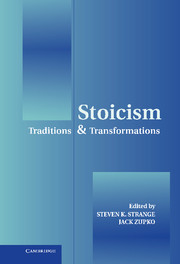Book contents
- Frontmatter
- Contents
- List of Contributors
- Acknowledgments
- List of Abbreviations
- Stoicism
- Introduction
- 1 The Socratic Imprint on Epictetus' Philosophy
- 2 The Stoics on the Voluntariness of the Passions
- 3 Stoicism in the Apostle Paul: A Philosophical Reading
- 4 Moral Judgment in Seneca
- 5 Stoic First Movements in Christianity
- 6 Where Were the Stoics in the Late Middle Ages?
- 7 Abelard's Stoicism and Its Consequences
- 8 Constancy and Coherence
- 9 On the Happy Life: Descartes vis-à-vis Seneca
- 10 Psychotherapy and Moral Perfection: Spinoza and the Stoics on the Prospect of Happiness
- 11 Duties of Justice, Duties of Material Aid: Cicero's Problematic Legacy
- 12 Stoic Emotion
- Works Cited
- Name Index
- Subject Index
5 - Stoic First Movements in Christianity
Published online by Cambridge University Press: 11 July 2009
- Frontmatter
- Contents
- List of Contributors
- Acknowledgments
- List of Abbreviations
- Stoicism
- Introduction
- 1 The Socratic Imprint on Epictetus' Philosophy
- 2 The Stoics on the Voluntariness of the Passions
- 3 Stoicism in the Apostle Paul: A Philosophical Reading
- 4 Moral Judgment in Seneca
- 5 Stoic First Movements in Christianity
- 6 Where Were the Stoics in the Late Middle Ages?
- 7 Abelard's Stoicism and Its Consequences
- 8 Constancy and Coherence
- 9 On the Happy Life: Descartes vis-à-vis Seneca
- 10 Psychotherapy and Moral Perfection: Spinoza and the Stoics on the Prospect of Happiness
- 11 Duties of Justice, Duties of Material Aid: Cicero's Problematic Legacy
- 12 Stoic Emotion
- Works Cited
- Name Index
- Subject Index
Summary
The great study on first movements in Christianity by O. Lottin ascribes the invention of the idea to the eleventh century. But in fact the idea of first movements in emotion has its first extant record a thousand years earlier in Seneca's On Anger, book 2, chapters 2–4, and has a long history in Christianity after that.
2.2.1 To what, you ask, is this inquiry relevant? It is so that we can know what anger is. For if it comes to birth against our will [invitis], it will never succumb to reason. For all movements which are not brought about by our will [voluntas] are beyond control and inevitable, like shivering when sprinkled with cold water and the recoil from certain contacts. At bad news our hair stands on end, at improper words a blush suffuses us, and vertigo follows when we look at a steep drop.
2.2.2 Anger is put to flight by precepts [praecepta]. For it is a voluntary vice of the mind, not something that comes out of some circumstance of the human lot, so befalls even the wisest. Under that heading we must put that first shock [ictus] of the mind which moves us after we believe there is an injustice.
2.2.3 This creeps in even amid the theatrical sights of the stage or the recital of ancient deeds. Often we seem [videmur] to be angry with Clodius for exiling Cicero and with Antony for killing him. Who is not roused [concitari] against the weapons of Marius, or the proscription of Sulla? Who is not disturbed [infestus] at Theodotus and Achillas and that child who dared the unchildlike crime?
- Type
- Chapter
- Information
- StoicismTraditions and Transformations, pp. 95 - 107Publisher: Cambridge University PressPrint publication year: 2004
- 3
- Cited by

